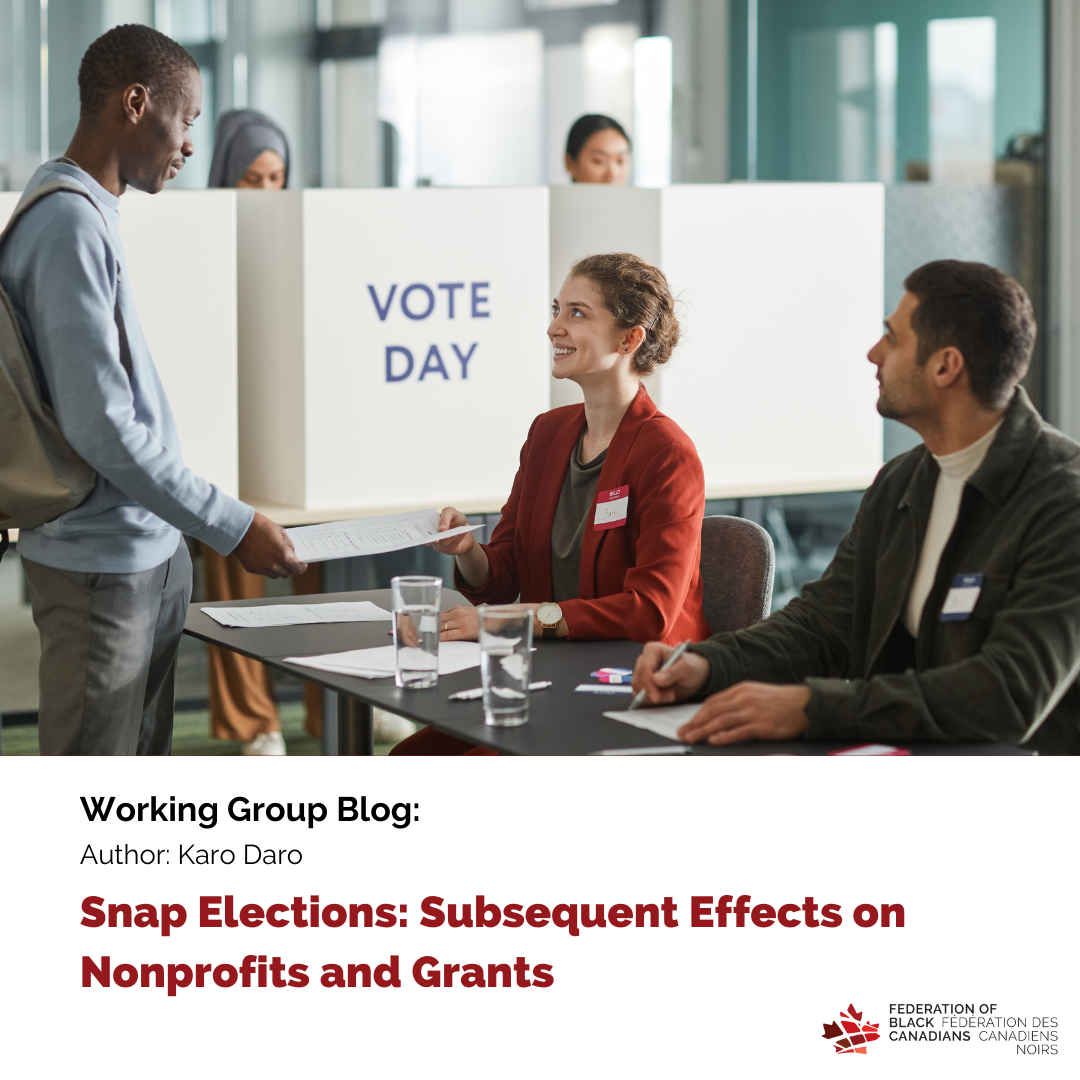Written by: Karo Daro
Elections, whether federal or provincial, can cause delays or disruptions in the funding process for charities, non-profits, and other organizations relying on government grants. During election periods, the government enters a “caretaker mode,” which often pauses grant approvals and decision-making until a new government is formed. This can affect both new applications and ongoing funding decisions. Charities and non-profits need to be aware of how election cycles might impact their funding and prepare for possible delays. Additionally, there are rules around election-related activities that organizations need to follow to avoid penalties. Below, we provide a clear overview of how elections affect grant funding, key planning tips, and important compliance information for organizations during election times.
Grant Funding During Provincial and Federal Election Cycles
Source: https://www.canadiancharitylaw.ca/blog/2025-federal-election-and-canadian-charities/
- During snap elections, all provincially or federally funded grant programs that require government or ministerial sign-off are typically paused.
- While applications may still be submitted, decisions are deferred until after the election concludes and a new government is formed.
- This delay affects both new applications and the continuation of previously approved funding.
Election Readiness: What Charities and Non-Profits Need to Know
Source: JN Clarke Consulting
- The Canadian government enters a “caretaker mode” during snap elections, suspending most policy and spending decisions.
- Non-profits should expect delays on grant approvals and should avoid assuming continuation of funding during this time.
- Strategic planning is crucial—charities and non-profits are encouraged to prepare by understanding potential risks and developing contingency plans.
How the Canadian 2021 Election Impacts Funding
- Grant programs that do not require active ministerial decisions may continue normally during elections.
- Programs requiring higher-level approvals are suspended until the post-election period.
- Delays vary based on election outcomes: a returning government leads to quicker resumptions, while a change in leadership can lead to months-long delays.
What Happens to Government Grants When an Election Is Called?
Source: https://www.canadiancharitylaw.ca/blog/2025-federal-election-and-canadian-charities/
- If the grant program is already budget-approved, it continues during an election.
- Applications are accepted and processed unless they require direct ministerial approval.
- Decision-making pauses once the writ is dropped, resuming only after a new cabinet is formed.
- The federal government was prorogued until March 2025; until the writ is dropped (anticipated April 28, 2025), intake continues.
- Organizations are encouraged to apply before the writ is dropped to minimize disruption.
How Elections Affect Grant Timelines and Funding in Canada
- Snap or regular elections delay federal funding decisions, especially those needing ministerial sign-off.
- Provincial programs (e.g., SWODF, RED, NOHFC) are generally unaffected.
- Joint federal-provincial programs often continue due to multi-year agreements and provincial administration.
- Federal programs like FedDev Ontario pause approvals but not intake or review.
Impact of Elections on Grants: How a New Government Can Change Funding Priorities
- Grant programs are vulnerable to change post-election based on the incoming party’s platform.
- Liberal win: Existing programs likely continue and may expand.
- Conservative win: Restructuring, delays, or cancellations of programs likely.
- NDP win: Shift toward individual-focused programs and socially conscious business models.
- Community organizations must stay aware of platform changes to align grant strategies accordingly.
4. Election Activity Rules for Canadian Charities and Nonprofits
- Under the Canada Elections Act, charities/NPOs spending over $500 on election-related activities must register as third-party advertisers.
- These activities include partisan communications, election surveys, and advertising about issues linked to candidates or parties.
- CRA confirms registration doesn’t affect charitable status, but organizations must remain non-partisan.
- Important: Many nonprofits may cross the $500 threshold unintentionally via boosted social media or issue-based campaigns.
Non-Profit Reporting Changes Introduced in the Fall Economic Statement 2024
- New reporting requirements introduced:
- NPOs earning more than $50,000 must file the T1044 NPO Information Return.
- Smaller NPOs will file a simplified short-form return.
- This increases fiscal transparency in anticipation of the 2026 FATF audit.
- Compliance will become a more prominent expectation for all NPOs regardless of size.
Community Guidance: What You Need to Know During Snap Elections
- Expect Delays: All government grants needing ministerial or cabinet sign-off will likely be put on hold. Submit your applications early and plan for decision delays.
- Understand Party Platforms: Stay informed on political platforms that may influence grant funding and priorities.
- Plan Ahead: Build buffer time into your programming and budget planning in case of funding interruptions.
- Register as a Third-Party Advertiser (if applicable): If engaging in public messaging during elections, especially on social or policy issues, register to avoid penalties.
- Stay Informed: Monitor federal and provincial differences. Updates from Elections Canada and relevant ministries to track developments affecting your sector.
- Adapt Strategically: Tailor grant applications to align with potential shifts in government priorities and be ready to revise plans post-election.
Understanding the Black Community as we Enter the 2025 Federal Elections
Beyond funding delays and compliance rules, elections are also a chance to check in with community priorities and make sure our voices are reflected in the national conversation.
That’s why FBC has created an anonymous survey to hear directly from Black Canadians about what matters most heading into the federal election—from housing and immigration to small business supports, racial justice, and more.
Click here to complete the survey. Your input will help shape a public report and guide the work of Black-led organizations across the country.




